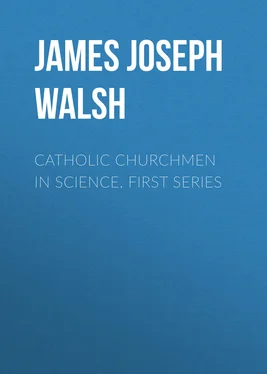James Walsh - Catholic Churchmen in Science. First Series
Здесь есть возможность читать онлайн «James Walsh - Catholic Churchmen in Science. First Series» — ознакомительный отрывок электронной книги совершенно бесплатно, а после прочтения отрывка купить полную версию. В некоторых случаях можно слушать аудио, скачать через торрент в формате fb2 и присутствует краткое содержание. Жанр: foreign_prose, foreign_religion, foreign_antique, на английском языке. Описание произведения, (предисловие) а так же отзывы посетителей доступны на портале библиотеки ЛибКат.
- Название:Catholic Churchmen in Science. First Series
- Автор:
- Жанр:
- Год:неизвестен
- ISBN:нет данных
- Рейтинг книги:4 / 5. Голосов: 1
-
Избранное:Добавить в избранное
- Отзывы:
-
Ваша оценка:
- 80
- 1
- 2
- 3
- 4
- 5
Catholic Churchmen in Science. First Series: краткое содержание, описание и аннотация
Предлагаем к чтению аннотацию, описание, краткое содержание или предисловие (зависит от того, что написал сам автор книги «Catholic Churchmen in Science. First Series»). Если вы не нашли необходимую информацию о книге — напишите в комментариях, мы постараемся отыскать её.
Catholic Churchmen in Science. First Series — читать онлайн ознакомительный отрывок
Ниже представлен текст книги, разбитый по страницам. Система сохранения места последней прочитанной страницы, позволяет с удобством читать онлайн бесплатно книгу «Catholic Churchmen in Science. First Series», без необходимости каждый раз заново искать на чём Вы остановились. Поставьте закладку, и сможете в любой момент перейти на страницу, на которой закончили чтение.
Интервал:
Закладка:
Succeeding centuries were not as fruitful in great scientists as the thirteenth, and yet at the beginning of the fourteenth there was a pope, three of whose scientific treatises–one on the transmutation of metals, which he considers an impossibility, at least as far as the manufacture of gold and silver was concerned; a treatise on diseases of the eyes, of which Professor Allbutt 4 4 Address cited
says that it was not without its distinctive practical value, though compiled so early in the history of eye surgery; and, finally, his treatise on the preservation of the health, written when he was himself over eighty years of age–are all considered by good authorities as worthy of the best scientific spirit of the time. This pope was John XXII, of whom it has been said over and over again by Protestant historians that he issued a bull forbidding chemistry, though he was himself one of the enthusiastic students of chemistry in his younger years and always retained his interest in the science 5 5 For the refutation of this calumny with regard to John XXII, see "Pope John XXII and the supposed Bull forbidding Chemistry," by James J. Walsh, Ph. D., LL. D., in the Medical Library and Historical Journal , October, 1905.
.
During the fourteenth century Arnold of Villanova, the inventor of nitric acid, and the two Hollanduses kept up the tradition of original investigation in chemistry. Altogether there are some dozen treatises from these three men on chemical subjects. The Hollanduses particularly did their work in a spirit of thoroughly frank, original investigation. They were more interested in minerals than in any other class of substances, but did not waste much time on the question of transmutation of metals. Professor Thompson, the professor of chemistry at Edinburgh, said in his history of chemistry many years ago that the Hollanduses have very clear descriptions of their processes of treating minerals in investigating their composition, which serve to show that their knowledge was by no means entirely theoretical or acquired only from books or by argumentation.
Before the end of this fourteenth century, according to the best authorities on this subject, Basil Valentine, the more particular subject of our essay, was born.
Valentine's career is a typical example of the personally obscure but intellectually brilliant lives which these old monks lived. It seems probable, according to the best authorities, as we have said, that his work began shortly before the middle of the fifteenth century, although most of what was important in it was accomplished during the second half. It would not be so surprising, as most people who have been brought up to consider the period just before the Reformation in Germany as wanting in progressive scholars might imagine, for a supremely great original investigator to have existed in North Germany about this time. After all, before the end of the century, Copernicus, the Pole, working in northern Germany, had announced his theory that the earth was not the center of the universe, and had set forth all that this announcement meant. To a bishop-friend who said to him, "But this means that you are giving us a new universe," he replied that the universe was already there, but his theory would lead men to recognize its existence. In southern Germany, Thomas à Kempis, who died in 1471, had traced for man the outlines of another universe, that of his own soul, from its mystically practical side. These great Germans were only the worthy contemporaries of many other German scholars scarcely less distinguished than these supreme geniuses. The second half of the fifteenth century, the beginning of the Renaissance in Germany as well as Italy, is that wonderful time in history when somehow men's eyes were opened to see farther and their minds broadened to gather in more of the truth of man's relation to the universe, than had ever before been the case in all the centuries of human existence, or than has ever been possible even in these more modern centuries, though supposedly we are the heirs of all the ages in the foremost files of time.
Coming as he did before printing, when the spirit of tradition was even more rife and dominating than it has been since, it is almost needless to say that there are many curious legends associated with the name of Basil Valentine. Two centuries before his time, Roger Bacon, doing his work in England, had succeeded in attracting so much attention even from the common people, because of his wonderful scientific discoveries, that his name became a by-word and many strange magical feats were attributed to him. Friar Bacon was the great wizard even in the plays of the Elizabethan period. A number of the same sort of myths attached themselves to the Benedictine monk of the fifteenth century. He was proclaimed in popular story to have been a wonderful magician. Even his manuscript, it was said, had not been published directly, but had been hidden in a pillar in the church attached to the monastery and had been discovered there after the splitting open of the pillar by a bolt of lightning from heaven. It is the extension of this tradition that has sometimes led to the assumption that Valentine lived in an earlier century, some even going so far as to say that he, too, like Roger Bacon, was a product of the thirteenth century. It seems reasonably possible, however, to separate the traditional from what is actual in his existence, and thus to obtain some idea at least of his work, if not of the details of his life. The internal evidence from his works enable the historian of science to place him within a half century of the discovery of America.
Конец ознакомительного фрагмента.
Текст предоставлен ООО «ЛитРес».
Прочитайте эту книгу целиком, купив полную легальную версию на ЛитРес.
Безопасно оплатить книгу можно банковской картой Visa, MasterCard, Maestro, со счета мобильного телефона, с платежного терминала, в салоне МТС или Связной, через PayPal, WebMoney, Яндекс.Деньги, QIWI Кошелек, бонусными картами или другим удобным Вам способом.
1
History of the German People at the Close of the Middle Ages . By Johannes Janssen Translated from the German by M A Mitchell and A M Christie. Vol I, p. 3.
2
Nikolaus Kopernicus, Der Altmeister der neueren Astronomie, Ein Lebens und Kultur Bild . Von Adolf Muller, S.J.
3
Professor of Astronomy and Physics at the Pontifical Leonine College of Anagni
4
Address cited
5
For the refutation of this calumny with regard to John XXII, see "Pope John XXII and the supposed Bull forbidding Chemistry," by James J. Walsh, Ph. D., LL. D., in the Medical Library and Historical Journal , October, 1905.
Интервал:
Закладка:
Похожие книги на «Catholic Churchmen in Science. First Series»
Представляем Вашему вниманию похожие книги на «Catholic Churchmen in Science. First Series» списком для выбора. Мы отобрали схожую по названию и смыслу литературу в надежде предоставить читателям больше вариантов отыскать новые, интересные, ещё непрочитанные произведения.
Обсуждение, отзывы о книге «Catholic Churchmen in Science. First Series» и просто собственные мнения читателей. Оставьте ваши комментарии, напишите, что Вы думаете о произведении, его смысле или главных героях. Укажите что конкретно понравилось, а что нет, и почему Вы так считаете.












